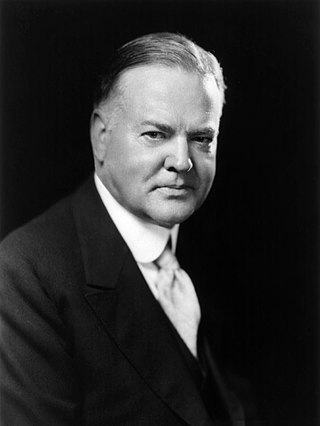Herbert Hoover
president of the United States from 1929 to 1933 From Wikipedia, the free encyclopedia
Remove ads
Herbert Clark Hoover (August 10, 1874 – October 20, 1964) was the 31st president of the United States from 1929 to 1933. He was a world-famous mining engineer and humanitarian administrator. As the United States Secretary of Commerce in the 1920s under Presidents Warren G. Harding and Calvin Coolidge, he promoted economic modernization.
Soon after he became president, the Great Depression started. Many people blamed Hoover for not doing enough to help people during that time, and many had to live in shantytowns called "Hoovervilles."
Remove ads
Early life and career
Hoover was born in West Branch, Iowa. He is the first president to be born west of the Mississippi River.
Hoover was a businessman and then became United States Secretary of Commerce. In 1927, Hoover appeared in the first public demonstration of television broadcast.[1]
Hoover and his wife learned Mandarin while he worked in China. They used it in the White House to prevent the staff there from understanding them.[2]
Remove ads
Presidency (1929–1933)
A few months after he was elected, the stock market crashed and the Great Depression was beginning.
Unlike Andrew Mellon and Calvin Coolidge, who believed that the federal government should keep its hands off the economy, Hoover believed that some action from the federal government was necessary.
While he opposed a welfare state, which would give money to people for doing nothing, he wanted to create jobs through several government programs, including the construction of a huge dam, which would be later named Hoover Dam.
Since the federal government received less money in tax revenues because of the bad economy, and the government was spending more money than it was taking in, Hoover tried to increase the government's revenue to balance the budget. He signed the Revenue Act of 1932, which was a large tax increase. He also signed the largest increase in tariffs, taxes on goods that are traded between foreign countries and the United States, increase in American history, which worsened the Great Depression, even though 1,028 economists signed a petition to him to accept it.
Hoover denied giving promised retirement money to poor World War I veterans earlier than what was agreed to and so the Bonus Army assembled in Washington, DC. Hoover ordered the United States Army to force them to leave. That resulted in a bloody conflict which hurt Hoover's reputation.
Hoover was uncharismatic and did not relate to the people well, which made many of them consider him as mean-spirited.
Hoover supported the very unpopular prohibition of alcohol,which made selling alcohol illegal.
While Hoover supported some government involvement in the economy, he was against Franklin Roosevelt's New Deal because he thought that it called for too much government involvement in the economy.
His failure to fix the Great Depression caused his loss of the 1932 election to Roosevelt.
Remove ads
Later life
Hoover later was known for opposing World War II and for chairing both Hoover Commissions to reform the ferderal government's administration.
Hoover died at the age of 90 in New York City on October 20, 1964, from gastrointestinal bleeding caused by colorectal cancer.
References
Other websites
Wikiwand - on
Seamless Wikipedia browsing. On steroids.
Remove ads

